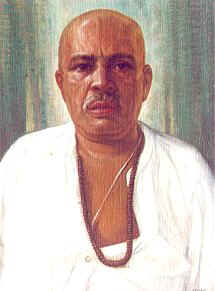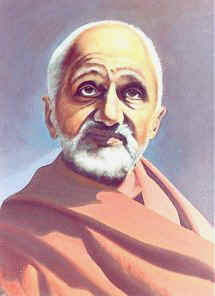Om Punya shravana keertha naaya namaha
Without my grace, not even a leaf can move.
---SAIBABA
OM SAI SRI SAI JAYA JAYA SAI
SHRADHA
 SABURI
SABURI
SAI BHAJAN (Click Here For Real Audieo)
Allah Thuma Ho Eeswara Thum Ho Thumhi Ho Rama Raheem
Thumhi Ho Ram Raheem
Merey Ram, Merey Ram, Rama Raheem (3x)
Esu Thum Ho, Nanak Thuma Ho
Zoraastra Bhi Ho, Mahavir Thuma Ho
Gauthama Buddha Kareem
Merey Ram, Merey Ram, Rama Raheem
Hindu Aye Musalmaan Aaye
Jain Parsi Sikh Bhi Aaye
Prema Sey Pyarey Isai Aaye
Mil Jaaye Aba Teri Duaye
Aye Therey Sameep, Merey Ram, Merey Ram Rama Raheem
(O Lord! Thou are known by many names: Allah, Buddha, Ishver, Ram, Raheem,
Isu (Christ), Guru Nanak, Zorastra, Mahavir, Karim and Lord Krishna. Hindu,
Buddhists, Muslim, Christian, Jain, Parsi, Sikh, all come to Thee for Thy
Blessings.)
Free Real
Player Download

|
SHRI SAI SATHCHARITHA
"Sada Nimbarvrikshasya mooladhiwasat,
Sudhasravinam tiktamapi-apriyam tam,
Tarum Kalpavrikshadhikam sadhayantam
Namameeshwaram Sadgurum Sai Natham"
|

|
dasganu
|
Chapter XX
|
swamisharananand
|
Kaka's Maid-Servant
On fully believing in Baba's words, he left Shirdi and
came to Vile Parle (a suburb of Bombay), and stayed with Kakasaheb Dixit. There
the next day, when Das Ganu was enjoying his morning nap (some say when he was
engaged in worship), he heard a poor girl singing a beautiful song in clear and
melodious tones. The subject matter of the song was a crimson coloured Sari, how
nice it was, how fine was its embroidery, how beautiful were its ends and
borders etc. He liked the song so much that he came out, and saw that it was
being sung by a young girl, the sister of Namya, who was a servant of Kakasaheb.
The girl was cleaning vessels, and had only a torn rag on her person. On seeing
her impoverished condition, and her jovial temperament, Das Ganu felt pity for
her and when Rao Bahadur M.V.Pradhan next day gave him a pair of dhotars, he
requested him to give a sari to the poor little girl also. Rao Bahadur bought a
good Chirdi (small Sari) and presented it to her. Like a starving person getting
luckily good dishes to eat, her joy knew to bounds. Next day she wore the new
Sari, and out of great joy and merriment, whirled, danced round and played
`Fugadi' with other girls and excelled them all. The Day following, she kept the
new Sari in her box at home and came with the old and torn rags, but she looked
as merry as she did the previous day. On seeing this, Das Ganu's pity was
transferred into admiration. He thought that the girl being poor had to wear a
torn rag, but now she had a new Sari which she kept in reserve and putting on
the old rag, strutted herself, showing no trace of sorrow or dejection. Thus he
realized that all our feelings of pain and pleasure depend upon the attitude of
our mind. On thinking deeply over this incident, he realized that a man ought to
enjoy whatever God has bestowed on him in the firm conviction that He besets
every thing, from behind and before, and on all sides and that whatever is
bestowed on him by God must be for his good. In this particular case, the
impoverished condition of the poor girl, her torn rag and the new Sari, the
donor, the dance and the acceptance were all parts of the Lord and pervaded by
Him. Hence, Das Ganu got a practical demonstration of the lesson of the
Upanishad - the lesson of contentment with one's own lot in the belief that
whatever happens, is ordained by God, and is ultimately good for us.
Bow to Shri Sai -- Peace be to all
Devotees Experiences
KHAPARDE'S SHIRDI DIARY
1910 December 5
- Monday Manmad
Shirdi.
Last night I & my
son Baba left by the 10.15 p.m. train as proposed. Purandare, Pathare,
Dhaujisha, his woodman, Bapu & others came to the station to see us off and
the first two brought flowers. I slept as soon as I got into my compartment
though I was awakened often. We reached Manmad about 9 a.m. today and stayed at
the railway station till nearly 1 p.m. I met one or two young men on the station
staff who very kindly helped us with things. One Haripant of Yeola also met us.
In the train to Copargaon, we met an Englishman who appeared exceptionally good
mannered and obliging. We reached Copargaon station about 2 p.m. hired two
conveyances, one for things and the other for ourselves to travel in. Bhaskar
Rao assisted us with tongas and gave us guavas to eat at his house and
accompanied us to Shirdi which we reached about 4 p.m. We put up in the wada
built for the convenience of people by Mr Chandkar. Madhavrao Deshpande was very
obliging & helped us & treated us like guests. There are in the Wada
Tatyasaheb Nulkar with his family, Bapusaheb Jog and Babasaheb Sahasrabuddhe. We
all went to see Sayin Maharaj soon after our arrival. He was in the masjid.
After salutations I & my son offered the fruits brought by us & gave
some money at his request. The Sayin Saheb then said that he has not been well
for the last two years & more, that he used to eat only barley cake &
take a little water. He showed his foot and pointed to a small sore, said it was
the string worm, that it was extracted but the string snapped & then it
reappeared & so on. He said he heard that it would not be well with him till
he went to his native town. He said he kept it in view but that was all, he
cared more for his people than even for his own life. He said he found no rest
as people troubled him. It could not be helped. Then he told us to withdraw
which we did.
Towards evening he passed by the wada and we went and saluted him. I
and Madhavrao Deshpande were together. After we saluted he said “Go to the wada
and sit quiet.” So I and Madhavrao returned. We all sat talking. They have many
miracles to relate. I, Baba and Babasaheb Sahasrabuddhe had something to eat at
night and after I returned to bed, a strange thing happened. The wife of Das
Ganu who has written the “Arvachim Sant lilamrit” and who is known as Tai came
and lay down by my side. I do not know how long she lay like that. When I woke
up I found her and was very much surprised. I requested her to go and from what
she said I made out that she was insane. So I woke up Madhavrao Deshpande who
took her to another part and told her to sleep there on pain of being
beaten.
The Khaparde diaries totalled forty-six in number. Khaparde mostly
used imported diaries. It was his habit to record the day's happenings at night
before going to sleep. However, at a later date he started writing the diaries
the following morning. He was a pleader by profession; this is evident in the
detailed and orderly presentation of the diary and the truthful and
dispassionate recording of facts.
Please send your experineces also to saivishnu@hotmail.com